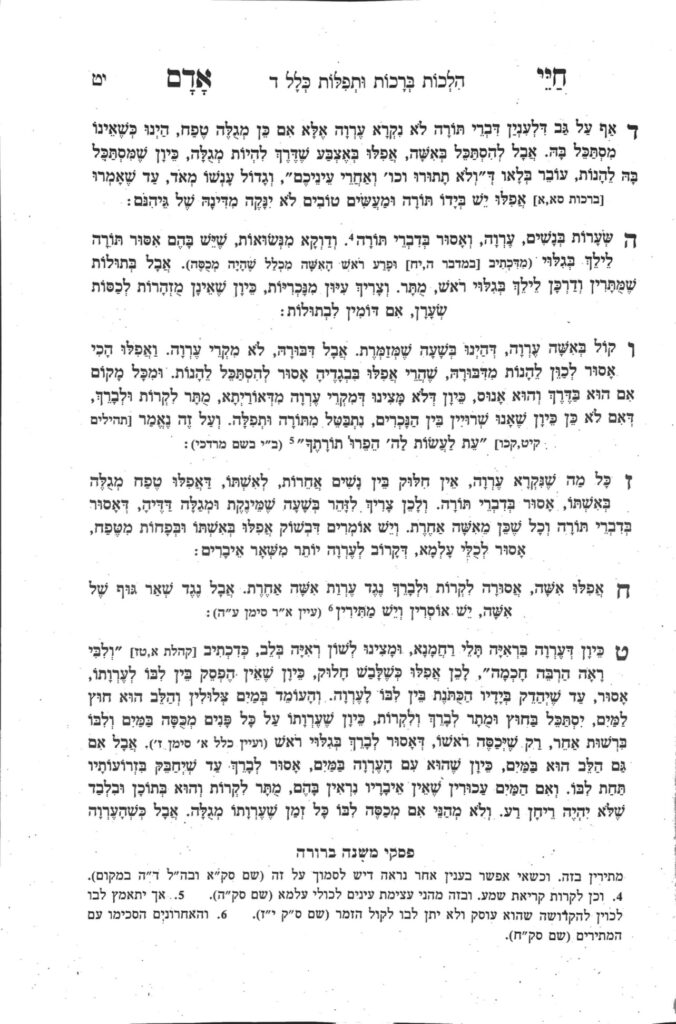We are continuing in siman 5. We learned the halacha brought in Shulchan Aruch, Orach Chaim siman 2, about being careful about the halachos of tznius.
In the Mishnah Berurah there, the Mishnah Berurah writes that one must act with the appropriate tznius and humility, aware that they are standing in Hashem’s presence. This is true even when it is dark, and even in one’s innermost rooms, as these make no difference to Hashem’s presence. Therefore, one must always be careful to avoid, when it is unnecessary, to uncover themselves. A man can uncover his arm until the elbow, and his neck until the chest, but one should not walk around barefoot.
The Mishnah Berurah then discusses how the halachos of tznius do not apply in a beis hamerchatz.
The Mishnah Berurah continues, and writes that if it is extremely difficult, one can be meikil. The sefer Beis Boruch, a peirush on the Chayei Adam, gives the example that if it is extremely hot, and one does not have air conditioning, maybe one may take off their shirt, and only wear an undershirt and tzitzis, in order to learn. However, he is uncomfortable to pasken. Either way, we see a concept of what is considered an extreme difficulty.
The source for this leniency is the Gemara, which says that women used to knead large amounts of dough by hand, and would uncover their elbows when doing so. Similarly, when washing clothing in the river, they would uncover parts of their legs. Thus, we see this concept of uncovering parts of the body at times of necessity. The Gemara does not fault the women for this lack of tzinus, as it is a situation of necessity. (On the other hand, the Gemara does point out that a man is responsible not to be present at those times.) Without great difficulty, one should not uncover themselves
We need to discuss whether the Shulchan Aruch writes these practices of tznius as halacha, or just as a good and pious way to act. Reb Moshe writes in a teshuva that the source for this practice is the Gemara in Shabbos with Rav Yosi, and Rav Yosi is speaking about something he personally did which was clearly not a standard practice. The Gemara brings it as part of a list of other actions of chassidus, so Reb Moshe understands that it is only an appropriate way to act, but is not halachically required.
Therefore, according to Reb Moshe, when there is a need one can be lenient. For example, when one wishes to get dressed in the morning, getting dressed under the covers can be cumbersome. Similarly, a woman getting dressed under the covers may cause her dress to get wrinkled. According to Reb Moshe, these situations can be considered a pressing need for which it would be muttar to get dressed standing up.
Reb Moshe continues, and discusses the halachos of the beis hakisei. The halacha is that a person has to remain tznius in the beis hakisei, and only reveal the part of the body which is necessary. However, Reb Moshe writes, if there is a shower in that room, the derech of that room is to get fully undressed, so one can be meikil and expose themselves more, because it is a place in which the halachos of tznius do not apply. This opinion is a chiddush, and not all poskim agree to this point.
Against this backdrop, we are ready to clarify whether a woman has a chiyuv of tznius at home. We will discuss this question in the upcoming shiurim, be’ezras Hashem.
Summary
The Shulchan Aruch writes that one must be careful to get dressed in a way that their body is not exposed, and, in general, not to expose themselves even in their innermost chambers. Reb Moshe understands that the Shulchan Aruch is referring to an appropriate practice, and not to a halachic requirement, so he holds one may be lenient when there is a pressing need.



